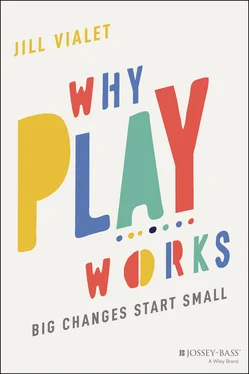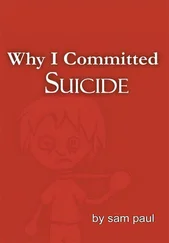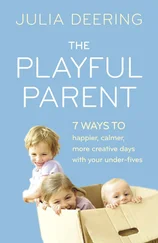Each of the Twenty Big Changeshas an accompanying Power of Play—insights related to how these changes show up at school—and a Small Start—a game or activity that is intended to make concrete the way that play can serve as a catalyst. I've also included a bunch of my favorite game recipes at the end of the book, and you can share those with others by sending them to the link: www.playworks.org/whyplayworksgameguide.
You'll also find a few Time‐Outsmixed in—ideas that offer slightly different ways of thinking about play, intended to spark your curiosity about the changes you might achieve.
The third and final section of Why Play Works, We Can Do This , looks at the role of adults in promoting play. This section is my call to action—an invitation to the reader to consider how you might become a more active enabler of play and the big changes it can prompt.
***
This is a critical moment in the American experiment. The polarization that defines our public discourse is extreme, and there is a pervasive sense of hopelessness about the possibility of finding common ground. This book sets out to show how play is precisely the counterintuitive solution we need at this moment. Although frequently dismissed as frivolous, nothing could be further from the truth. Play is the antidote to disconnection, isolation, fear, distrust, and despair. It can help in mitigating trauma while building the confidence and resilience essential to navigating risk. It is a source of joy that facilitates understanding across difference. It taps our intrinsic motivation, teaches us to deal with the unexpected, and sparks creativity. Play is where we learn the changemaking skills—the everyday, inclusive leadership skills—that this moment so desperately requires. With this book, I invite you to suspend your disbelief and to consider how play might work for you, your community, and our democracy.
1 1Bleeker, M., S. James‐Burdumy, N. Beyler, A. H. Dodd, R. A. London, L. Westrich, K. Stokes‐Guinan, and S. Castrechini. “Findings from a Randomized Experiment of Playworks” (April 17, 2012). Mathematica Policy Research and the John W. Gardner Center for Youth and Their Communities.
2 2 www.playworks.org/workbook.
Play, Seriously: The Theory and Science Behind Play
You may be wondering why I'm starting out with this overview of the foundational, big ideas behind play. The truth is that I wasn't all that familiar with any of these theories or the science of play when I launched Sports4Kids—nor when we changed the name to Playworks. It would have helped. It would have made it easier to convince some people and to explain away other people's reservations. I'm not sure it would have radically changed any of our choices, but it might have informed them. And knowledge is power.
All that said, as you will see, a key element of play is volition. My hope is that your engagement with this book will be as playful as possible, and so, by all means, skip ahead to the next section if you so choose. But know that you are cordially invited to spend a little time here learning about play's storied history— play defined, play theory, and the emerging field of play science.
It's true that a better understanding of the ideas behind play might have influenced our name change. For the first 13 years we were known as Sports4Kids. This name had seen us from almost the very beginning (we were briefly Kidsports until receiving a cease and desist order from another organization). It had accompanied us through significant growth in staff—including opening new offices in cities across the country, the development of our leagues, and our first big AmeriCorps grant. It was the name we were using when the Robert Wood Johnson Foundation (RWJF) decided to invest an astronomical $4.4 million in an initial plan to achieve national scale. And, perhaps most importantly, Sports4Kids was the name—with its accompanying logo—that was on literally thousands of t‐shirts that staff and students wore with a sense of pride and belonging.
Changing an organization's name is a surprisingly complicated undertaking. Not so much in the actual logistics of it—those are fairly straightforward. The complicated part comes in managing all the emotions associated with a name change. To our credit, we didn't take the emotional aspect of our name change lightly. The entire process took almost 18 months from the initial idea of looking at redesigning our logo through deciding to do a whole rebrand, to selecting the name and actually producing new t‐shirts. Looking back, it seems clear that one of the most important aspects of this shift was in developing our ability to explain why. Why Playworks? It was so important—especially for our staff—that the story wasn't simply why not Sports4Kids, even if the 4 in the middle did seem hopelessly 1980s in the rearview mirror. Our name change had to be about becoming something bigger.
With support from RWJF, we worked with a friend and board member, Dru DeSantis, and her firm DeSantis Breindel to go through a very professional process. The team interviewed stakeholders—students, principals, staff, and funders—about the nature of our programming and impact. They generated concepts, solicited suggestions, and made presentations. They brought in two industry superstars—women from Miami, referred to somewhat mysteriously as “the naming ladies,” who generated a list of over 500 names that I remember spending hours poring over.
There was a lot of creativity and a few false starts. We briefly fell in love with the name “Big Bounce,” until someone pointed out that our female staff members might not be super‐psyched to have that emblazoned on their chests. There was another name—that now escapes me—that I knew we absolutely had to have, but someone else owned it.
Playworks wasn't actually on the list. It emerged during a presentation to staff members when we were stalled and decided to go back to the drawing board and review what we knew. Dru was walking us through a slide deck—yet again—on all our various attributes and values, emphasizing what principals and teachers said about our impact over and over again. In summation she noted, “Play works.” Our then executive director David Rothenberg and then COO Elizabeth Cushing looked at each other, and we had found our new name.
But why the shift from sports to play? Sports hold a funny place in American life. Although many people in the US love sports, there is a not‐insignificant population that see sports as somewhat suspect. Some of these humans work in schools, and they would argue that they have been driven to this position by the extreme way we push young people into sports. They see sports as competition for the time and attention of their students and a distraction from the “real” work of teaching and learning.
Play and sports, although deeply connected, aren't exactly the same. Usually in sports your goal is trying to win. And that really does change everything. One of my favorite definitions of a game comes from the philosopher Bernard Suits, who explains a game as the “voluntary attempt to overcome unnecessary obstacles.” 1 Fundamentally, there is an attitudinal difference between having an end goal or not. It's not that play isn't serious and sports are—play can be extraordinarily serious. It's not that play is always fun, either. People often think of play as the opposite of work, but as the New Zealand play theorist Brian Sutton‐Smith wrote, “The opposite of play is not work. The opposite of play is depression.” 2 The difference is really in the fundamental question, “to what end?”
Читать дальше












